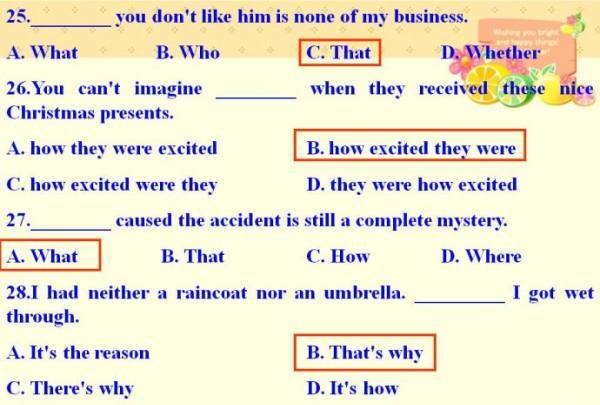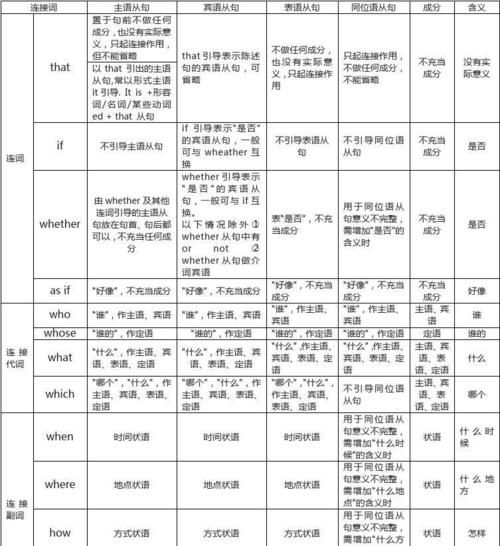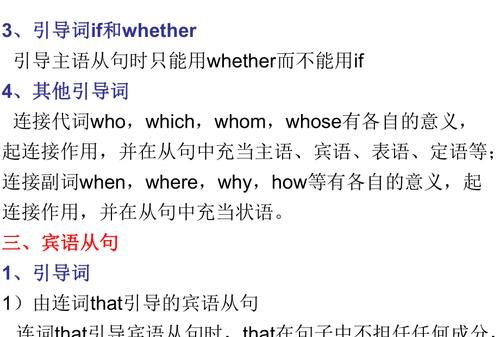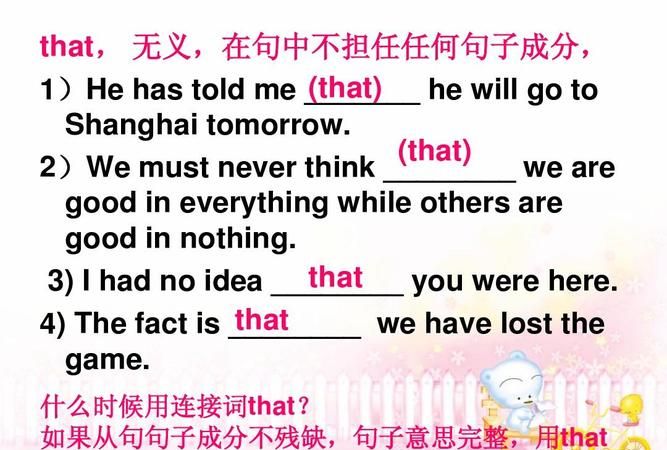本文目录
名词性从句的连接词做句子成分吗
引导名词性从句的连接词可分为三类:
连词(5个):that (本身无意义。引导单一的宾语从句时that常可省略,但引导主语从句、表语从句、同位语从句时that通常不被省略)
whether,if (均表示“是否”表明从句内容的不确定性)
as if ,as though ( 均表示“好像”,“似乎”)
◆以上在从句中均不充当任何成分
连接代词(10个):what/ whatever, who/ whoever, whom/ whomever, whose/whosever, which/ whichever
连接副词(7个):when/ whenever, where/ wherever, how/ however, why
不可省略的连词:
1. 介词后的连词。
2. 引导主语从句和同位语从句的连词不可省略。
That she was chosen made us very happy.
We heard the news that our team had won.
3. 在从句中做成分的连词. whether与if 均为是否的意思。 但在下列情况下,只可用whether:
1. whether引导主语从句并在句首。
eg:Whether he can come to the party on time depends on the traffic.
2. 引导表语从句。
eg:The question is whether we can get in touch with her.
3. whether从句作介词宾语。
eg:I am thinking about whether I should quit my present job.
4.if与whether都可以与or not 连用,但后面紧跟or not 时只能用whether。
We didn't know whether or not she was ready.(此时只能用whether)
I wonder whether/if the news is true or not.(此时则二者都可以用)
5.后面直接跟动词不定式时。
6.引导同位语从句时。

英语中的n.v.adj.adv.分别代表什么?
引导名词性从句的连接词可分为三类: 连词(5个):that(无意义,不可省,不充当任何成分) whether,if(均表示“是否”表明从句内容的不确定性) as if ,as though(均表示“好像”,“似乎”) 以上在从句中均不充当任何成分 连接代词(9个):what, whatever, who, whoever, whom, whomever, whose, which, whichever 连接副词(7个):when, where, how, why, whenever, wherever, however 不可省略的连词: 1. 介词后的连词 2. 引导主语从句和同位语从句的连词不可省略。 That she was chosen made us very happy. We heard the news that our team had won. 比较 whether与if 均为"是否"的意思。 但在下列情况下,只可用whether: 1. whether引导主语从句并在句首 2. 引导表语从句 3. whether从句作介词宾语 4. 从句后有"or not" 5. 引导同位语从句 Whether he will come is not clear. 大部分连接词引导的主语从句都可以置于句末,用 it充当形式主语。 It is not important who will go. It is still unknown which team will win the match.

名词性从句引导词的选择
名词性从句的连接词选用
名词性从句包括主语从句,表语从句,宾语从句和同位语从句。在各种考试中,其最主要的考查内容为连接词的选用。名词性从句的连接词可细分为以下四种:(1)以that来引导从句;(2)以whether/if引导从句;(3)以特殊疑问词引导从句;(4)以关系代词/副词引导从句。
一、以that引导从句
当从句的意思已完整时,名词性从句用that引导,that在从句中不作任何句子成分,仅起连接作用。如:
It is certain that he will do well in his new job. (主语从句)
Do you know that he has been admitted to Beijing University? (宾语从句)
My decision is that we are to start at 6 tomorrow morning. (表语从句)
The news that our team had won the game excited everybody. (同位语从句)
当用that引导从句时,需注意以下情况:
1.在主语从句中,that一般不可省略,尤其是当主语从句位于句首时,它绝对不可省略。如:
That our team had won the game was good news to us.
2.在宾语从句中,that可省略。但当句中有两个并列的宾语从句时,引导第二个宾语从句的that不可省略。如:
Everybody knows (that) the earth goes round the sun.
Everyone knew what happened and that she was worried.
3.当句子是以it作形式宾语时,引导宾语从句的that不可省略。如:
He has made it clear that he will not give in.
4.that一般不能引导介词的宾语从句,偶尔可在except, but, besides和in(在于…;在…方面)的后面引导宾语从句,that不可省略。如:
Your homework is quite good except that you have made two small mistakes.
The reason lies in that she works harder than the others do.
He differed from other people in that he always looked farther ahead in his work.
在其它介词后面需要用that引导宾语从句时,必须用it作形式宾语。如:
You may depend on it that I shall always help you.
5.在表语从句和同位语从句中,that不可省略。如:
My advice is that you must give up smoking right now.
The fact that he is a thief shocked all of us.
二、以whether/if引导从句
引导名词性从句的whether/if意为“是否”。在使用时,要注意两者存在以下区别。
1.在主语从句中,whether既可引导位于句首的主语从句,也可引导用it作形式主语的主语从句,而if只能引导以it作形式主语的主语从句。如:
Whether the work can be completed on time is doubtful.
It is doubtful whether/if the work can be completed on time.
2.在宾语从句中,当其后紧跟or not时,只能用whether,不能用if。如:
I don’t care whether/if he comes or not.
I don’t care whether or not he comes.
3.在介词后面的宾语从句中,只能用whether,不能用if。如:
It all depends on whether they will come back.
4.在表语从句和同位语从句中,只能用whether,不能用if。如:
The problem is whether the money will be enough.
I have no idea whether the money will be enough.
三、以特殊疑问词引导从句
英语中所有用来构成特殊疑问句的特殊疑问词均可以用来引导名词性从句,其选择取决于从句句意的需要。如:
It remained unknown who(谁) let out the news.
I don’t know what(什么)I was thinking of.
The problem is where(哪里) we should stay.
My question how(怎样) I shall get in touch with him has not been answered.
选择特殊疑问词需注意的情况:
1.要注意特殊疑问词在从句中所担当的句子成分:疑问代词可作主语、宾语和表语,而疑问副词(where, when, why, how)只能作状语。如:
I can’t imagine who did it. (作主语)
I can’t imagine how he did it. (作状语)
2.Who在从句中既能作主语,也能作宾语,而whom只能作宾语。如:
It hasn’t been decided who will manage the company.
They haven’t decided whom they should help.
四、以关系词引导从句
用关系词引导的名词性从句又可称作名词性关系从句,因为它实际上是先行词与在其后的定语从句的结合。引导这种名词性从句的关系词有:what(=the thing that), whoever(=anyone who), whichever(=anyone/anything that), where(=the place where), when(=the time when)等。如:
What they need is a good rest.
I can judge by what I know of him.
Whoever did this job must be rewarded.
Whichever he likes will be given to him.
We shall not forget when the meeting will be held.
She walked up to where he stood.
用关系词引导名词性从句时需要注意wh-ever与no matter wh-的区别。Wh-ever既可引导名词性从句,又可引导让步状语从句;而no matter wh-只能引导让步状语从句。如:
Whatever I said, he wouldn’t listen to me. (=No matter what I said, he wouldn’t listen to me.)(引导让步状语从句)
He would believe whatever I said. (引导宾语从句)
最后,关于名词性从句的连接词要指出的是,根据句意,引导表语从句的还可以是as if/as though, because, as。如:
It looks/seems as if it’s going to rain.
It was because I got up late.
Things were not as they seemed to be.
但是,当reason作主句的主语时,引导表语从句只能用that,如:
The reason for my absence was that I was ill.

高中名词性从句经典例句
名词性从句
在复合句中起名词作用的从句叫做名词性从句。它包括主语从句、宾语从句、表语从句和同位语从句。
分析历届高考试题名词性从句考查的焦点主要有以下六个方面
1. 考查名词性从句的语序问题
2. 考查引导词that与what的区别
3. 考查it在名词性从句中作形式主语或形式宾语的用法
4. 考查whether与if的区别
5. 考查名词性从句中的疑问词+ever引导的名词性从句与no matter+疑问词引导的状语从句的区别
6. 考查名词性从句的虚拟语气问题
语法要点剖析
一、名词性从句
主语从句、表语从句、宾语从句、同位语从句,在整个句子中所起的作用,相当于一个名词。因此,这四种从句通称为名词性从句。
引导名词性从句的连接词可分为三类:
连接词:that, whether, if (不充当从句的任何成分)
连接代词:what, whatever, who, whoever, whom, whose, which.
连接副词:when, where, how, why
1. 主语从句
作句子主语的从句叫主语从句。
主语从句引导词:
通常由从属连词that,whether,if;
连接代词what,who,which,whatever,whoever;
连接副词how,when,where,why等词引导。
that在句中无词义,只起连接作用;
连接代词和连接副词在句中既保留自己的疑问含义、又起连接作用,在从句中充当从句的成分。例如:
What he wants to tell us is not clear. 他要跟我们说什么,还不清楚。
It is known to us how he became a writer.我们都知道他是如何成为一名作家的。
Where the English evening will be held has not yet been announced.
英语晚会将在哪里举行,还没有宣布。
有时为避免句子头重脚轻,常用形式主语it代替主语从句作形式主语放于句首,而把主语从句置于句末。主语从句后的谓语动词一般用单数形式。
常用句型如下:
(1)It + be + 名词 + that从句
(2)It + be + 形容词 + that从句
(3)It + be + 动词的过去分词 + that从句
(4)It + 不及物动词 + that 从句
例:It worried her a bit that her hair was turning grey
注意在主语从句中用来表示惊奇、不相信、惋惜、理应如此等语气时,谓语动词要用虚拟语气“(should) +do”,常用的句型有:
It is necessary (important, natural, strange, etc.) that …
It is a pity (a shame, no wonder, etc.) that…
It is suggested (requested, proposed, desired, etc.) that…
2. 宾语从句
名词句用作宾语的从句叫宾语从句。引导宾语从句的关联词与引导主语从句表语从句的关联词大致一样,在句中可以作谓语动词或介词及非谓语动词的宾语。
1. 由连接词that引导的宾语从句(陈述意义)
由连接词that引导宾语从句时,that在句中不担任任何成分,在口语或非正式的文体中常被省去,但如从句是并列句时,第二个分句前的that不可省。例如:
He has told me that he will go to Shanghai tomorrow. 他已经告诉我他明天要去上海。
We must never think (that) we are good in everything while others are good in nothing.
我们决不能认为自己什么都好,别人什么都不好。
注意:在demand、order、suggest、decide、insist, desire, demand, request, command等表示要求、命令、建议、决定等意义的动词后,宾语从句常用“(should)+ 动词原形”。例如:
I insist that she (should) do her work alone. 我坚持要她自己工作。
The commander ordered that troops (should) set off at once. 司令员命令部队马上出发。
2. 用who,whom, whose, which, what, when, where, why, how, whoever, whatever, whichever等关联词引导的宾语从句相当于特殊疑问句,应注意句子语序要用陈述语序。(特殊疑问意义)
例如: I want to know what he has told you. 我想知道他告诉了你什么。
She always thinks of how she can work well. 她总是在想怎样能把工作做好。
She will give whoever needs help a warm support. 凡需要帮助的人,她都会给予热情的支持。
3. 用whether或if引导的宾语从句,其主语和谓语的顺序也不能颠倒,仍保持陈述句语序。(疑问意义)
此外,whether与if 在作“是否”的意思讲时在下列情况下一般只能用whether,不用if:
a. 引导主语从句并在句首时;
b. 引导表语从句时;
c . 引导从句作介词宾语时;
d. 从句后有“or not”时;
e. 后接动词不定式时。
例如: Whether there is life on the moon is an interesting question.
月球上有没有生命是个有趣的问题。
Everything depends on whether we have enough money. 一切要看我们是否有足够的钱。
4. 注意宾语从句中的时态呼应。
当主句动词是现在时,从句根据自身的句子情况,而使用不同时态。
例如: he studies English every day. (从句用一般现在时)
he studied English last term. (从句用一般过去时)
I know (that) he will study English next year. (从句用一般将来时)
he has studied English since 1998. (从句用现在完成时)
当主句动词是过去时态(could, would除外),从句则要用相应的过去时态,如一般过去时,过去进行时,过去将来时等;当从句表示的是客观真理,科学原理,自然现象,则从句仍用现在时态。
例如:The teacher told us that Tom had left us for America.
5. think, believe, imagine, suppose等等动词引起的否定性宾语从句中,要把上述主句中的动词变为否定式,即“否定前移”。即将从句中的否定形式移到主句中。
例如: We don’t think you are here. 我们认为你不在这。
I don’t believe he will do so. 我相信他不会这样做。
6.如果宾语从句后面有宾语补足语,则用it作形式宾语,从句后置。
We must make it clear that anyone who breaks the law will be punished.
我们必须认清无论谁违反了法律都要受到惩罚。
3. 表语从句
在句中作表语的从句叫表语从句。
其基本结构为:主语 + 系动词 + 从句。(系动词:be动词、seem、感官的动词(feel/taste/smell/look)、变化的动词(become/turn/get))
引导表语从句的引导词
连词:that/whether/as if
The problem is(that) they can’t get here early enough.
问题是他们不能很早到达这里。
It looks as if it’s going to rain.看起来天要下雨。
连接代词:Who/What/Which
That’s just what I want. 这正是我想要的。
The question is who(which of you) will be the next speaker.
问题是谁(你们哪一位)接着发言。
连接副词:When/Where/Why/How
This is where our problem lies.
这就是我们的问题所在。
That is why he didn’t come to the meeting.
那就是他为什么不到会的原因。
需要注意的,当主语是reason时,表语从句要用that引导而不是because。例如:
The reason why he was late was that he missed the train by one minute this morning
4. 同位语从句
同位语从句说明其前面的名词的具体内容。同位语从句通常由连词that,whether以及连接副词when, how, where引导。(注:if, which 不能引导同位语从句。)
可用于同位语从句的名词有advice、demand、doubt、fact、hope、idea、information、message、news、order、problem、promise、question、request、suggestion、truth、wish、word等。例如:
The news that we won the game is exciting. 我们赢得这场比赛的消息令人激动。
He must answer the question whether he agrees to it or not.
他必须回答他是否同意这样一个问题。
I have no idea when he will come back home. 我不知道他什么时候回来。
The thought came to him that Mary had probably fallen ill. 他想到可能玛丽生病了。(有时同位语从句可以不紧跟在说明的名词后面,而被别的词隔开。)
同位语从句和定语从句的区别:
that作为关系代词,可以引导定语从句,充当句子成分,在从句中作宾语时可以省略; that引导同位语从句时,起连词的作用,没有实际意义,不充当句子成分,一般不能省略。
试比较下面两个例句:
I had no idea that you were here.(that引导同位语从句,不能省略)
Have you got the idea(that)this book gives you of life in ancient Greece?(that引导定语从句,作宾语,可以省略)

以上就是关于名词性从句连接词用法归纳 ,名词性从句的连接词做句子成分吗的全部内容,以及名词性从句连接词用法归纳 的相关内容,希望能够帮到您。
